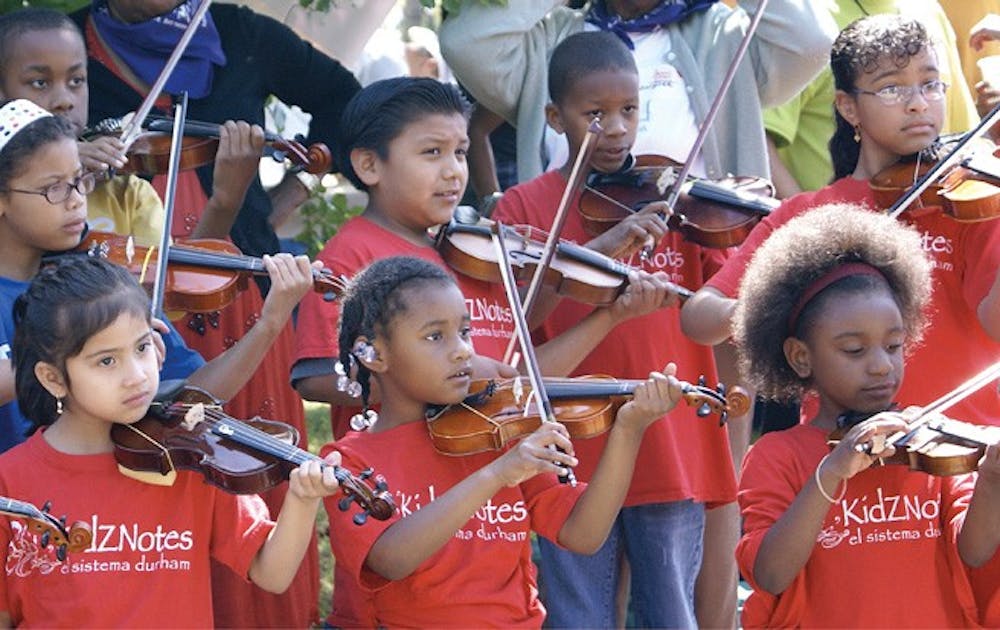On the surface, a group of kindergartners playing a noisy rendition of “Twinkle, Twinkle Little Star” on their violins might just look like regular children causing a ruckus. But it’s actually a step forward in using art as a catalyst for social change in the Durham community. On Feb. 15 and 16, Duke and KidZNotes, a nonprofit organization for high-need children, will collaborate to host “Take a Stand,” a Regional Professional Development session on art, entrepreneurship, leadership and civic engagement.
Based in Durham, KidZNotes was founded in September 2010 in order to provide free classical music instruction to targeted underprivileged kindergarten through fifth graders in the East Durham area. Beginning with 60 students from three Title I Durham elementary schools, KidZNotes has since grown to 200 enrolled students from five schools. Each child begins with a violin and ten hours of instruction a week, and the instrument belongs to them as long as they remain in the program. Once students advance from the beginners level, they can choose to play from other string, brass and wind instruments.
“We have been fortunate in that people will approach us asking, ‘Can we have this program at our school?’” said Jennifer Blank, Development and Marketing Manager at KidZNotes. “We work in partnership with the schools and several community partners who help point us in the right direction.”
KidZNotes is one of the first programs implemented in the United States that was officially inspired by El Sistema, a Venezuelan program founded in the 1970s designed to combat poverty, strengthen inner city education and foster positive decision-making. Entirely funded by the Venezuelan government, the program kick-starts literacy, social skills and perseverance in young children. It now boasts over 200 children’s and youth orchestras. KidZNotes is a much newer and smaller program, but it’s one of a growing number of El Sistema-inspired US organizations.
Blank continued, “We’re constantly trying to identify other programs, entrepreneurs and communities that are working toward the same goals to share and talk about using music, or art, as a positive social change tool.”
That’s where “Take a Stand” comes in. Through interactive panel discussions, the conference will address the question of how to enact social change and to catalyze development through the arts, using KidZNotes and El Sistema as examples. Hands-on and interdisciplinary, “Take a Stand” is meant to attract a wide audience, with sessions to actively and creatively engage teachers, students and community members. Over a dozen confirmed speakers will offer their various expertise, representing institutions at Duke, Bard College, the LA Philharmonic, the Center for the Advancement of Social Entrepreneurship and more.
“We’re targeting people who are really interested in seeing how we can improve a community. We’re trying to be creative about how we look at social change,” said Blank. “This is a great example of bringing people together to share ideas to further the program, the movement, the idea that no one should be unable or left behind because of how they grew up. Everybody should be able to have the same opportunities for beauty, passion, community.”
Ken Rogerson, the Director of Undergraduate Education for Public Policy at Duke, will be a speaker at “Take a Stand,” emphasizing the skills and critical thinking taught in public policy relevant to the arts. “It’s what we call a development issue,” says Rogerson. “Usually when we think of development we think of international organizations helping those in poorer areas of the world. This is development locally—high-need populations and ways to deal with that. This is a different way of getting the public involved in the local, economic and social development in the community.”
Alexis Spieldenner is a Duke senior, SOL participant and harpist. She will also be a featured speaker from Duke at “Take a Stand.” She first attended the symposium herself in Los Angeles, and has had various opportunities since to immerse herself in the El Sistema movement in Durham.
“As a harpist, I have always been fascinated by the transformative power of music and its ability to serve as a catalyst for social change,” said Spieldenner. “In conducting interviews with KidZNotes parents and students, I found that music was far from an extracurricular activity for these families. It had become a fundamental part of their lives. Music has given these children a voice.”
Both Rogerson and Spieldenner emphasized arts policy—attaining grants and funding, identifying specific population needs, developing programs and cultivating partnerships. They particularly accentuated the importance of the university and its individuals in increasing levels of civic engagement through the arts.
“At the finale of the symposium in LA, the founder of the El Sistema movement noted that the future of the El Sistema movement here in the US would be heavily dependent on the university,” said Spieldenner. “I think Duke has tremendous potential to lead the way in creating opportunities for students to pursue their passion not only for music, but for social change.”
“Take a Stand” will be held Friday, Feb. 15 in the Nelson Music Room, and Saturday, Feb. 16 at the Holton Career and Resource Center. More information at www.kidznotes.org/take-a-stand/register-and-details/.
Get The Chronicle straight to your inbox
Signup for our weekly newsletter. Cancel at any time.

